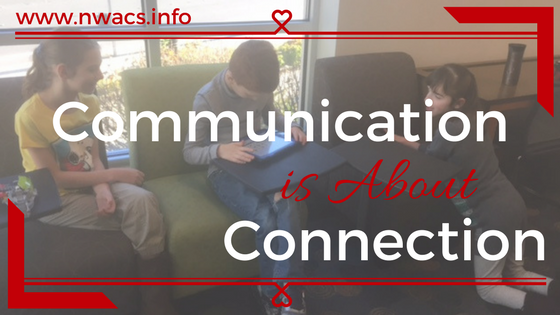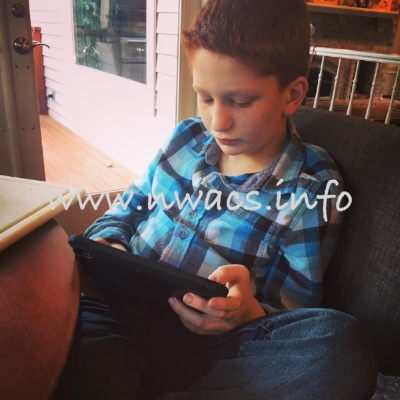by Rachel Nemhauser, Parent to Parent Coordinator (Ark of King County) and AAC parent
My son Nate is 13 years old, and for a kid often described as ‘minimally functionally verbal’, he’s pretty skilled at expressing himself. Using a combination of talking, signing, pointing, gesturing, grunting, and even acting, he can convey a lot of what’s going on in his head without needing to string complex sentences together. In fact, he’s so good at it that you might think his unique communication formula is fully adequate – that he’s able to share everything he wants to share. I’m his mom though, and I know there’s so much more going on his head that he can’t tell me about. I find that heartbreaking.
I love the ways that Nate has found to communicate, but I know it’s not enough. Many years ago, when Nate was in Kindergarten, his team of therapists introduced the idea of using technology to help Nate communicate. At five years old they started teaching him to use an AAC device, and have been working on it pretty steadily ever since.
Nate sitting, holding and looking at his tablet/AAC device.
Like most kids, Nate has loved his tablet from the minute they handed it to him 8 years ago. He quickly figured out how to download games from the app store, and even occasionally orders toys from Amazon.com. He’s very proficient at getting around parental controls, and he is obsessed with YouTube videos. However, despite years of effort and practice, he completed elementary school with very little interest in voluntarily using his AAC device to communicate.
It is hard to understand why a kid who has so much to say, and also loves using an iPad so much, would resist using his device to assist in his communication. Why wouldn’t he want help getting his point across? Why wouldn’t he want to be more clearly understood? Why wouldn’t he want talking to be easier? These questions nagged at me until I looked around one day at the people in Nate’s life – his family, his classmates, his teachers – and the answer hit me. We’re expecting him to want to use AAC to communicate when he doesn’t know a single other person who does. All of us learn to communicate by watching the people around us, yet we were expecting Nate to go it alone? No wonder he wasn’t interested.
Two years ago, to offer Nate and others like him the opportunity to communicate and socialize with other AAC users, I created Smooth Talkers. Sponsored by The Arc of King County and Parent to Parent, Smooth Talkers offers AAC users of all ages and skill levels in East King County the chance to play, learn, and socialize with other AAC users in a fully recreational setting. It’s most definitely not speech therapy or school. Instead, kids come to Smooth Talkers to play, to hang out with other kids, and to just have fun.
For two years, it has been incredible to watch. Children and families gather together once a month at an East King County library and they use their devices to communicate while they hang out. Some kids are fully versed and others are just learning, but every single kid has a device in their hands when they walk in the door. Every kid gets to notice they’re not the only one in the room learning to talk with AAC. Every one of them spends an hour a month feeling part of a group, watching others learn, and maybe feeling just a little less different than they might normally feel.
In addition to the kids having an opportunity to connect, parents and other family members also gain so much from attending Smooth Talkers. By chatting monthly with other parents, they receive support, encouragement, technical help and logistical advice. Just like their children they get to have their experience normalized, and the opportunity to learn by watching others.
Smooth Talkers meet-up
Smooth Talkers has changed and grown over the years.
During year one, the kids primarily played informally with toys while their parents chatted and supported each other. Some conversation via AAC took place, but it was minimal.
During year two, we were lucky enough to have a Speech Therapist join our team, leading the group in more structured games that encouraged AAC use and back-and-forth communication.
We are about to start year three, and in addition to Smooth Talkers: East King County, we are very proud to now offer Smooth Talkers: South King County, and Smooth Talkers: En Espanol. We know that different communities and different cultural groups have different needs, and we’re excited to offer new Smooth Talkers locations that are relevant and convenient to the communities they serve.
Nate is still a reluctant AAC user but he takes a tremendous amount of pleasure from seeing other kids who communicate like he does. As his mom, I continue to learn from other parents new ways to encourage Nate in his AAC journey. It’s a slow process but we’re moving forward and Smooth Talkers is helping.
I know from many years of experience that there are no easy answers when it comes to supporting a child who is learning to use AAC to communicate. It takes time, it takes patience, and it takes practice. It also most definitely takes friends, community and connection. It is so powerful to watch a family come to Smooth Talkers and fit all those tools in place, and it’s even more powerful to see a young person succeed in expressing themselves.
To read more about Nate and raising a child with a disability, please visit Rachel’s blog.
For more information about Smooth Talkers, The Arc of King County or Parent to Parent, contact Rachel Nemhauser, Parent to Parent Coordinator at the Arc of King County. RNemhauser@Arcofkingcounty.org / 206-829-7046
Have you been to a Smooth Talkers meet-up? Comment below and tell us about it!
Keep an eye on our Calendar for upcoming Smooth Talkers meet-ups.




